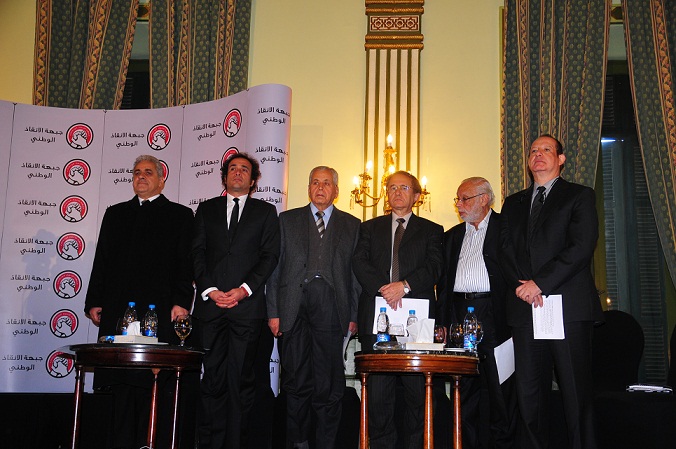BENGHAZI: Libya’s rebels said on Tuesday their war against Moammer Qaddafi’s regime had entered a "decisive phase" and that victory was possible by the end of the month.
That confident claim was echoed by the country’s exiled crown prince, and came after Washington said the "days are numbered" for veteran strongman Moammer Qaddafi’s regime.
As the chorus grew, fighting raged across Libya, with the rebels denying they were in talks with a defiant Qaddafi, who predicted a swift victory against both the rebels and NATO.
Mansur Saif Al-Nasr, the rebel National Transitional Council’s envoy to Paris, said "our forces totally control Zawiyah (to the west of the capital), which will open the way to Tripoli. This will allow the population there to revolt,"
"We are entering a decisive phase. Soon we will liberate all of southern Libya. We hope to celebrate the final victory at the same time as the end of Ramadan" on or around August 31, he told RFI radio.
Zawiyah is a vital oil port on Libya’s Mediterranean coast, 40 kilometers (25 miles) west of Tripoli. Rebels claimed Monday to control "most" of the town, but Qaddafi’s loyalist forces continued to bombard the area with Grad rockets.
Six Grad missiles hit Zawiyah, sparking a fierce heavy artillery exchange that caused an unknown number of casualties.
In a report Tuesday on its operations a day earlier, NATO said it had hit tanks and an armed vehicle near Zawiyah.
In western Libya, Qaddafi forces shelled the centre of Zawiyah on Monday hours after rebels claimed they had seized most of the strategic port, an AFP reporter said.
Abdulsalam Othman, spokesman for the rebel western military council, said on Monday that both towns were in rebel hands, as well as the 15-kilometre stretch of road linking Sorman to Zawiyah, which he said meant that Tripoli’s supply lines from Tunisia were severed.
Qaddafi spokesman Mussa Ibrahim denied the rebel claims, saying regime forces were in "total control" of Zawiyah, and that the insurgent presence was "very weak."
And he said it was actually government troops that had cut the highway leading to Tunisia to "protect people."
The rebels also claimed to have wrested control of the town of Sorman, 60 kilometers west of Tripoli, and Garyan, 50 kilometers to the south.
Ibrahim said government forces had already retaken Sorman and would "soon retake Garyan."
He also said government forces had repulsed a major rebel attack coordinated with NATO on Tiji, in the Nafusa Mountains south of Tripoli, and that 40 prisoners had been taken.
On the eastern front, rebels battled loyalist forces around oil installations on Monday in the town of Brega, where the rebels have seized rows of seaside apartment blocks that once housed oil workers.
After a week of street-by-street combat, Brega was like a ghost town.
Under the shade of trees lay the bombed out carcass of a rocket-launching battery, its tubes still aimed at the old rebel lines.
In an alleyway were the remains of a destroyed loyalist vehicle. Nearby, young fighters with long beards and wearing keffiyehs took a few minutes rest on the veranda of a house, greeting visitors with Allah Akbar (God is greatest.)
Four-by-four vehicles full of rebels could be seen heading to the fighting in an industrial area to the west, from which heavy smoke rose, meeting ambulances, sirens screaming, heading for a first-aid station.
NATO said it had hit four multiple rocket launchers in the vicinity of Brega.
On Monday, sources close to the Tunisian security services reported talks had taken place on the island of Djerba, near the Libyan border.
The reports of rebel-regime negotiations sparked a swift denial from Benghazi, the insurgency’s stronghold in eastern Libya.
"There are no negotiations or talks between the Qaddafi regime and the NTC in Tunisia or anywhere else," NTC Vice Chairman Abdel Hafiz Ghoga said.
The United States expressed optimism that the rebels were closing in on Qaddafi, who has ruled for more than 40 years, with White House spokesman Jay Carney saying the increasingly isolated strongman’s "days are numbered."
And Prince Mohammed el-Senussi said in a message to Libyans marking six months since the uprising began, that if his country’s rebels keep their unity and resolve, Qaddafi will be toppled from power "sooner rather than later."
A defiant Qaddafi denied widespread rumors he had fled the country and predicted victory.
"The end of the colonizer (NATO) is close and the end of the rats is close. They (the rebels) flee from one house to another before the masses who are chasing them," Qaddafi declared in an audio message on Libyan television.
He called on his supporters to "prepare for the battle to liberate" the rest of the country.
The Libyan regime has denied it is in danger, insisting that its forces can retake towns and districts captured by the rebels in recent days.
"Our mujahedeen forces are capable of exterminating these gangs," Ibrahim said in Tripoli.
Meanwhile, Qaddafi’s Deputy Interior Minister Mabruk Abdallah flew from Djerba to Egypt on a private plane with nine relatives, a Cairo airport security official told AFP, though it was not clear if he was defecting.
Ibrahim said merely that he had gone to the Egyptian capital for "personal reasons."
Dozens of high-ranking officials have turned their back on Qaddafi since the pro-democracy uprising erupted, inspired by the so-called Arab Spring.

